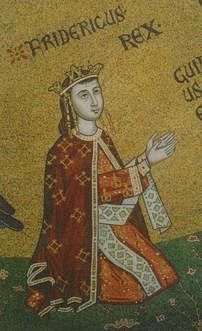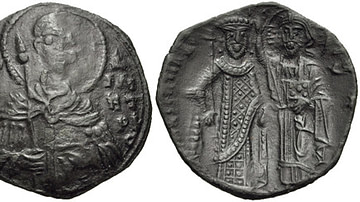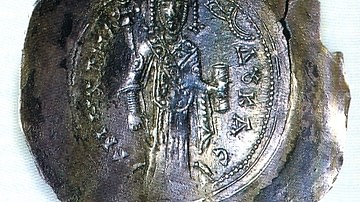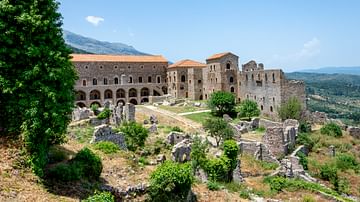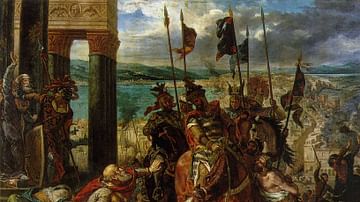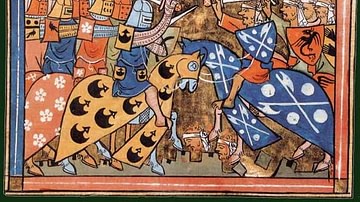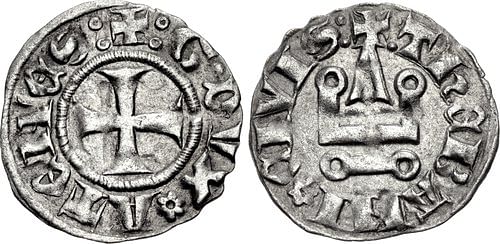
The Duchy of Athens was a Latin or Frankish state in Greece that existed from 1205 to 1458 CE. It was created in the aftermath of the Fourth Crusade (1202-1204 CE) and would be ruled for the majority of its history by the Burgundian de la Roche family, the Catalans under the rule of the kings of Sicily, and the Florentine Acciaioli family. As a Latin state in Greece, it was closely connected to its neighboring states as well as the rulers of southern Italy and imposed feudal law on its small territory in Attica, Boeotia, and later Thessaly.
Establishment of the Duchy
Following the sacking of Constantinople by the Fourth Crusade in 1204 CE, the Latin crusaders and Venetians carved up the Byzantine Empire. Under this partition, the new Latin Empire would receive one-fourth of the Byzantine Empire, including Constantinople. The Venetians and the other Latin crusaders would each receive a quarter and a half of the Byzantine Empire. The issue with this partition, however, was that it was all theoretical. At that time, only Constantinople had been taken; the rest of that fallen empire had to be conquered by force.
The Latins were initially quite successful in Europe and established a series of new Latin principalities: the Kingdom of Thessalonica, the Principality of Achaea, the Triarchy of Negroponte, and the Duchy of Athens, among others. The leading Latin nobles were allotted land in Greece, nominally beholden to the King of Thessalonica or the Latin Emperor. Otto de la Roche (r. 1205-1225/1234 CE), a Burgundian nobleman, was appointed as the Duke of Athens. While Athens had been an important religious center during the Byzantine Empire, the city itself was of minimal importance during this period, being far outshone by the glories of its ancient past. Otto fortified the Athenian acropolis and expanded his territory, receiving the cities of Thebes, Argos and Nauplia, and Damala. Thebes was especially important, as it had been the center of Byzantine silk production, and was thus critical for the prosperity of the duchy.
Unlike some of his Latin neighbors, Otto remained loyal to both the Kingdom of Thessalonica and the Latin Empire. At the same time, he had difficulties at home when he tried to impose Catholicism on his new Orthodox subjects and fought against the traditional privileges of the Orthodox clergy. Otto also started to implement feudal law and used French as the language of administration. Otto died sometime in 1234 CE, but he possibly stepped down as duke as early as 1225 CE to allow his son Guy I de la Roche (r. 1225/1234-1263 CE) to rule.
Latin Dukes
Guy's rule was generally successful, and Athens was prosperous during this period, being left unmolested by its neighbors. The War of the Euboeote Succession (1256-1258 CE) brought this peace to a close as Guy backed the local Euboean triarchs and the Venetians but was defeated by Prince William II Villehardouin of Achaea (r. 1246-1278 CE) in 1258 CE and forced to surrender when Thebes was besieged. William tried to depose Guy, and Guy traveled to France to receive a judgment on whether William was Guy's liege lord due to Guy's territory in the Peloponnese in Greece. The decision was in the negative, but one positive of Guy's journey was that King Louis IX of France (r. 1226-1270 CE) officially raised Athens to the level of a duchy; prior to this, it was technically only a lordship. Another benefit was that with Guy gone, the Duchy of Athens was not involved in the disastrous Battle of Pelagonia against the Byzantines in 1259 CE, in which the flower of Achaean knights had been slaughtered and William was captured. Upon returning to Greece, Guy was even made administrator of Achaea while William languished in a Byzantine prison.
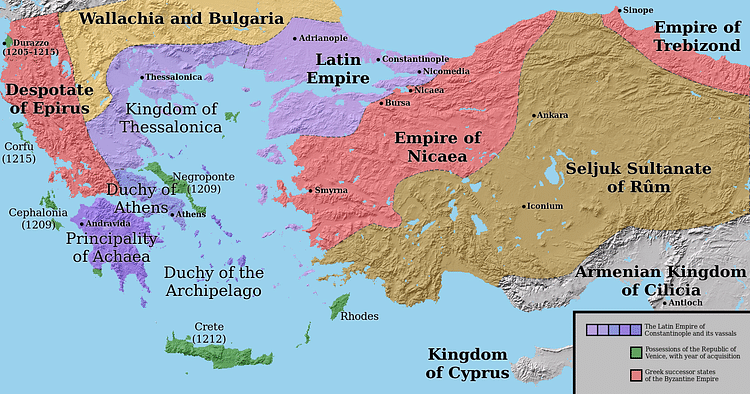
William's successor, Guy II de la Roche (r. 1287-1308 CE), became the guardian of the young Thessalian ruler John II Doukas (r. 1303-1318 CE), increasing Athenian power to its greatest height. But When Guy died, John, now old enough to rule in his own right, tried to break free from Guy's successor, Walter of Brienne (r. 1308-1311 CE). Walter called in the Catalan Company, a famous group of mercenaries from Aragon that had previously served the Byzantine emperor until the Byzantines murdered their leader, leading to years of the Catalans ravaging the Byzantine countryside. When they started to move toward southern Greece, Walter engaged them to reassert Athenian power in Thessaly. The Catalans were successful, retaking several castles and ravaging the Thessalian plain, but Walter was unnerved by their success and marched his own army north to defeat them. The Battle of Halmyros in 1311 CE was an unmitigated disaster for the Duchy of Athens; Walter was killed in the fighting and the Catalans took Athens. They were to be the new dukes of Athens.
Catalan Athens
The Catalans quickly acknowledged the suzerainty of Frederick III of Sicily (r. 1295-1337 CE), whom the Catalan Company had previously served in Sicily before entering Byzantine service. Frederick appointed his son Manfred (r. 1312-1317 CE), and Catalan rule over Athens would thus primarily be in the hands of second and third sons of the Aragonese kings of Sicily, and their representatives in Athens. The Catalans kept the feudal administration of the duchy, although they used Aragonese feudal law and instituted Catalan as the language of administration.
The Duchy of Athens expanded to the north when John II of Thessaly died, absorbing the southern half of that state. The Catalans made this part of Thessaly the Duchy of Neopatras, although in reality it was always unified under Catalan rule with the Duchy of Athens. The only serious threat to Catalan rule was when Walter of Brienne's son, also named Walter, led a crusade against the Catalans in 1331 and 1332 CE, but the Catalans merely retreated behind the walls of Athens and Thebes, and Walter, without the ability to engage in a protracted siege of either city, was forced to withdraw in defeat.
The Catalans mostly endured until 1379 CE, when the Navarrese Company, a group of mercenaries from the kingdom of Navarre in modern-day Spain and France, sacked Thebes and the surrounding region of Boeotia on behalf of James of Baux, the titular Latin Emperor. The Catalans continued to rule Athens until 1388 CE when the Florentine banking family of the Acciaioli captured Athens with the help of the Navarrese Company; Neopatras was captured by the Acciaioli two years later.
The Final Decades
The final decades of the Duchy of Athens were a sad affair, and it was only a matter of time until the territory fell to one of its more powerful neighbors. Nerio I Acciaioli (r. 1388-1394 CE) ruled for a time, but briefly after his death, Athens was besieged by the Ottoman Turks, who emerged over the previous century as the leading power in the region. In desperation, one of Nerio's brothers offered Athens to Venice in 1395 CE in order to protect the city. But Nerio's son, Antonio, still held Thebes, and in 1402 CE, recaptured the city from the Venetians. Both Antonio and Venice appealed to the Ottoman Empire for assistance, but the Ottomans were distracted by a series of civil wars in the aftermath of their defeat at the Battle of Ankara in 1402 CE. Therefore, peace was concluded between Antonio and Venice in 1405 CE, with Antonio being recognized as Antonio I Acciaioli (r. 1403-1435 CE). Antonio promoted learning and culture in Athens but militarily was closely aligned with the Ottomans and continued to harass the Venetians.
When Antonio died, the Athenian throne was contested between his nephews, Nerio II (r. 1435-1439, 1441-1451 CE) and Antonio II (r. 1439-1441 CE). This dispute only weakened Athens, and following a war with the Ottomans, he was forced to become a vassal of the Byzantines in the Despotate of the Morea in 1444 CE and hand over Thebes, following the capture of Athens by Byzantine arms. However, Ottoman forces recaptured Thebes for the Duchy of Athens shortly thereafter.
The final dukes of Athens, Francesco I Acciaioli (r. 1451-1455 CE) and Francesco II Acciaioli (r. 1455-1458 CE), effectively ruled at the pleasure of the Ottomans. Once Constantinople fell to the Ottomans in 1453 CE, it was just a matter of time before the Duchy of Athens fell too. In 1456 CE, Turahanoğlu Bey, one of the commanders of the Ottoman sultan Mehmed II (r. 1444-1446, 1451-1481 CE), invaded the duchy, and in 1458 CE, conquered the city. Francesco II was killed two years later on the orders of the sultan. The Duchy of Athens, which had survived through mixed fortunes and dynasties, a creation from the aftermath of the Fourth Crusade, was finally at an end.
